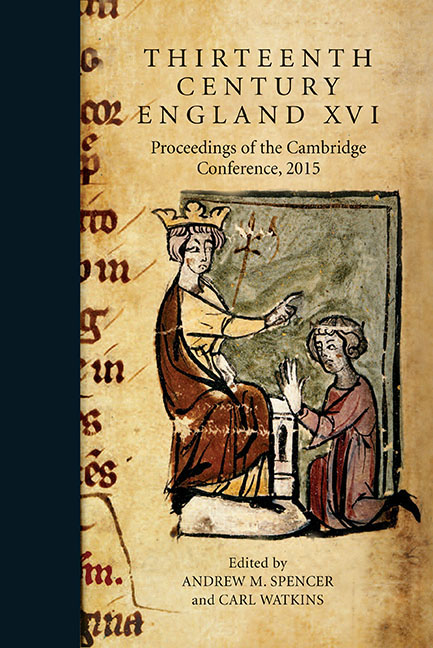Book contents
- Frontmatter
- CONTENTS
- List of Illustrations
- List of Contributors
- List of Abbreviations
- Introduction
- The Uncertainties of Reformers: Collective Anxieties and Strategic Discourses
- Moral Dilemmas in English Confessors’ Manuals
- Damnatio Eternae Mortis or Medicinalis Non Mortalis: The Ambiguities of Excommunication in Thirteenth-Century England
- The Contribution of Thomas Docking to the History of Political Thought
- Dealing with Inadequate Kingship: Uncertain Responses from Magna Carta to Deposition, 1199–1327
- The Rebel's Four Dilemmas in the Long Thirteenth Century
- The Daughters of William the Lion and Queen Ermengarde
- Simon de Montfort and the Ambiguity of Ethnicity in Thirteenth-Century Politics
- The Hue and Cry in Thirteenth-Century England
- Recalling Anglo-Scottish Relations in 1291: Historical Knowledge, Monastic Memory and the Edwardian Inquests
Introduction
Published online by Cambridge University Press: 23 August 2019
- Frontmatter
- CONTENTS
- List of Illustrations
- List of Contributors
- List of Abbreviations
- Introduction
- The Uncertainties of Reformers: Collective Anxieties and Strategic Discourses
- Moral Dilemmas in English Confessors’ Manuals
- Damnatio Eternae Mortis or Medicinalis Non Mortalis: The Ambiguities of Excommunication in Thirteenth-Century England
- The Contribution of Thomas Docking to the History of Political Thought
- Dealing with Inadequate Kingship: Uncertain Responses from Magna Carta to Deposition, 1199–1327
- The Rebel's Four Dilemmas in the Long Thirteenth Century
- The Daughters of William the Lion and Queen Ermengarde
- Simon de Montfort and the Ambiguity of Ethnicity in Thirteenth-Century Politics
- The Hue and Cry in Thirteenth-Century England
- Recalling Anglo-Scottish Relations in 1291: Historical Knowledge, Monastic Memory and the Edwardian Inquests
Summary
Uncertainty might be an inescapable element of the human condition, but it is susceptible to exploration in historical terms, its forms being constructed by culture, which both generates uncertainty and supplies means to manage and mitigate its effects. The powerful presence of uncertainty in the Middle Ages is suggested by widespread invocations of fickle fortune, mutability and instability, these often serving as means to lift the reader's gaze up from a world in flux to another, better one that was still and sure. It is revealed in other, very different circumstances, such as the interest paid to prophecy and prognostication, whether mundane or apocalyptic in form. And its existence is implied by structures – pastoral and sacramental, familial and political – that supplied practical support and psychological scaffolding to lives full of fragility. No collection of proceedings can possibly aspire even to adumbrate so sprawling and open-ended a subject. Rather what appears in this volume is a collection of essays, aligned to varying degrees with the theme, that touch on aspects of it, more especially in the arenas of Christian life and thought, politics and law. What remains in this introduction is a few words about salient points and connections pertaining to the common theme.
Four essays treat topics intersecting religious and intellectual history. In the first, Amanda Power makes a case study of the letters of Adam Marsh a means to illuminate the thought of his circle. She places uncertainty in a cosmic and spiritual context. Certainty ultimately was to be found outside mortal life, beyond the broken world, save for brief revelatory flashes – biblical, prophetic, miraculous – when it was encountered in terrestrial time and space. It was the ambition of the reformer to extract from these scintillations means – rules and practices – that might be of use to believers in the perilous search for salvation, such that elements of certainty might be ‘institutionalised’ in the life of the church. This enterprise might be heartfelt on the part of those engaged in it – undertaken in a world that they felt was slipping into disorder and in need of regeneration. It was also, necessarily, a means to power, but one achieved through utterances about right belief and practice that appealed to many who sought authoritative assurances.
- Type
- Chapter
- Information
- Thirteenth Century England XVIProceedings of the Cambridge Conference, 2015, pp. x - xivPublisher: Boydell & BrewerPrint publication year: 2017



